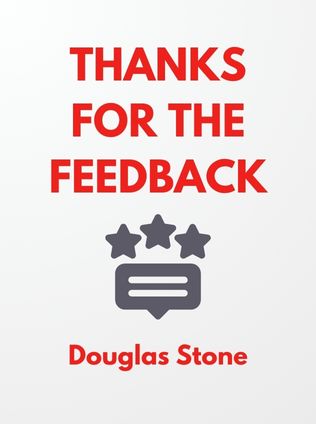
Thanks for the Feedback
The Science and Art of Receiving Feedback Well
By Douglas Stone,
Published 03/2014
About the Author
Douglas Stone and Sheila Heen are both Lecturers on Law at Harvard Law School and the co-founders of Triad Consulting. Their notable collaboration also includes the New York Times business bestseller Difficult Conversations: How to Discuss What Matters Most. With a blend of humor and clarity, they leverage their extensive experience in negotiation and conflict resolution to delve into the nuanced topic of receiving feedback effectively in their book Thanks for the Feedback: The Science and Art of Receiving Feedback Well (even when it is off base, unfair, poorly delivered, and frankly, you're not in the mood).
Main Idea
Thanks for the Feedback explores the challenging yet essential task of receiving feedback well. Stone and Heen argue that while much focus is placed on how to give feedback effectively, the true leverage lies in educating receivers. The book examines why feedback is crucial for personal and professional growth and provides a framework to help individuals engage with feedback constructively, even when it is difficult to hear. The authors identify three triggers—truth, relationship, and identity—that often block learning and offer strategies to manage these reactions, enabling readers to transform feedback into a powerful tool for improvement.
Table of Contents
- Introduction
- The Feedback Challenge
- Truth Triggers
- Relationship Triggers
- Identity Triggers
- Understanding and Using Feedback
- The Blind Spot
- Feedback in Organizations
- Conclusion
The Feedback Challenge
Receiving feedback well is fraught with difficulty because it sits at the intersection of our desire to learn and our need for acceptance. Stone and Heen highlight that this tension is natural and inevitable. They argue that feedback is vital for relationships and professional development, yet it often triggers resistance due to its potential to threaten our self-perception.
“Receiving feedback sits at the junction of two conflicting human desires: we want to learn and grow, but we also want to be accepted just as we are right now.” — Douglas Stone and Sheila Heen
The authors emphasize that the real leverage in improving feedback processes lies not in perfecting how we give feedback, but in enhancing our ability to receive it. They propose that by understanding our triggers and managing our reactions, we can turn feedback into a tool for learning and growth.
Truth Triggers
Truth triggers are set off by the content of the feedback itself. When feedback is perceived as inaccurate, unfair, or unhelpful, it can provoke feelings of indignation and defensiveness. The authors suggest that understanding these triggers is crucial for managing our reactions and engaging in productive feedback conversations.
Sign up for FREE and get access to 1,400+ books summaries.
You May Also Like
The Subtle Art of Not Giving a F*ck
A Counterintuitive Approach to Living a Good Life
By Mark MansonRich Dad Poor Dad
What the Rich Teach Their Kids About Money - That the Poor and Middle Class Do Not!
By Robert T. KiyosakiHow To Win Friends and Influence People
The All-Time Classic Manual Of People Skills
By Dale CarnegieFreakonomics
A Rogue Economist Explores the Hidden Side of Everything
By Steven D. Levitt and Stephen J. Dubner



















